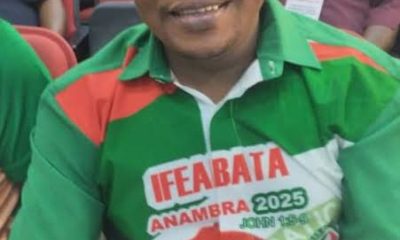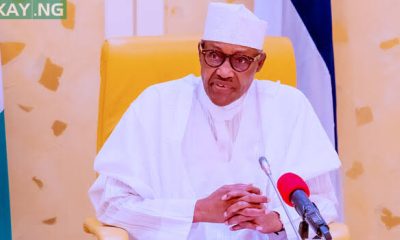Opinion
Did Yagba Federal Constituency Rotation Arrangement End in 2011?
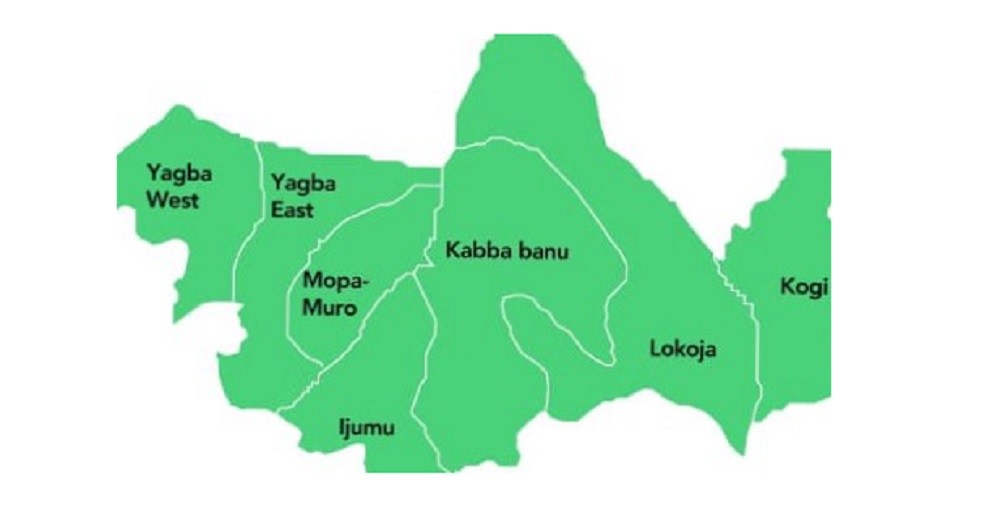
By Debo Alabi
Yagba Federal Constituency in the western Kogi senatorial zone, consists of three local councils, namely Mopamuro, Yagba East and Yagba West. In 1999, at the outset of the Fourth Republic political dispensation in Nigeria, each of the three local government areas fielded aspirants for the seat. The Peoples Democratic Party, (PDP), the dominant political association at the time, guaranteed success for its flagbearers. In the run-up to the 1999 polls, all eyes were on the PDP primaries. Shola Ojo, (Mopamuro); Tolorunjuwon Joseph Faniyi (Yagba East), Engr Sunday Karimi and Mrs Margret Orebiyi, (Yagba West) were the frontrunning aspirants. Orebiyi would later step down for Karimi. Despite the superior strength of Yagba West, which consists of 14 electoral wards, four more than Mopamuro and Yagba East with 10 electoral wards apiece, the PDP ticket was eventually decided in favour of Ojo (Mopamuro).
Ojo’s emegence was more of a consensus in an arrangement superintended by party elders under the leadership of the respected patriarch and one of the founding fathers of PDP in Nigeria, the late Chief Sunday Awoniyi. Aspirants from the two other local government areas were prevailed upon by the elders to await their turns in subsequent electoral cycles. Meanwhile, Yagba West fielded a candidate for the 1999 election in the late legal icon, Chief Tunji Arosanyin who was the flagbearer of the defunct All Peoples Party (APP). Ojo, also an attorney, hitherto domiciled in Kano, the formidable hub of commerce in northern Nigeria, went on to win the general election of that year.
Ojo served in the “Green Chamber” from 1999 to 2003. At that time, PDP’s internal, mutual understanding based on the rotation principle expressly asserted that each LGA would serve just one term, after which the position would rotate to another. Contestants for the 2003 PDP ticket included Karimi, Faniyi, Mrs Funmi Abiodun, a lawyer; the Port Harcourt based quantity surveyor and expert in the Marine sector, Bode Olorunsola and J.K Odeyemi, an engineer. The primary election was headed for a runoff between Faniyi and Karimi, but, again, the elders in their wisdom settled for a simple majority. Faniyi picked PDP ticket and he went on to defeat his opponent in the reconfigured APP, which had then become the All Nigeria People’s Party, (ANPP), Mrs Justina Abanida. Abanida, a one time Commissioner for Justice and Attorney General. Abanida, a lawyer, hails from Egbe, Yagba West Council.
For Karimi, the waiting game continued even when the seat berthed in Yagba West. Karimi lost PDP’s ticket to a fellow Yagba West opponent, Samuel Bamidele Aro.. Aro, a successful oil marketer, won the 2007 election into the House of Representatives, which took place on April 21, 2007. He defeated Bolaji Oluwafemi of the defunct Action Congress (AC) and served in the lower parliament until 2011.
The extant rotational arrangement forbade Mopamuro and Yagba East from fielding candidates for the 2007 election. In fairness to the past occupants of the seat, performance was not a yardstick for continuity. Based on the extant zoning template of the PDP, the baton was expected to be passed back to Mopamuro in 2011. However, at the conclusion of his first term in 2011, Aro, the incumbent declared his intention for a second term. Backed by the Kogi State governor at the time, Ibrahim Idris and machinery of the ruling party at the state level, Aro defeated his lone challenger for the PDP ticket, Chief Folorunsho Daniyan, (from Mopamuro). However, the outcome of 2011 primary election that threw up Aro did not sit well with the factional PDP who beckoned on Karimi to step forward in another political party.
Karimi’s name was a last-minute inclusion in the portal of the Independent National Electoral Commission (INEC) as the candidate of Action Congress of Nigeria (ACN). In what turned out a historic protest vote, Karimi defeated PDP’s Aro in the general election held on April 9th, 2011. The strength of the PDP had been further decimated in the aftermath of the controversies that trailed its primaries. Daniyan left PDP and flew the flag of the ANPP. He came third in the general election. For the first time, in 2011, Mopamuro, Yagba West and Yagba East all fielded candidates for the House of Representatives.
The 2011 episode effectively marked the fatal end to one term and rotation of the seat in Yagba Federal Constituency.
Highlights
Karimi got the mandate of Yagba people to represent them in 2011 when he did not aspire for it from the start to the race and when it was supposed to be the turn of Mopamuro. He was not even on the list of aspirants jostling for the much-sought ticket of the PDP in that year’s primaries. He also became the first Yagba man to be reelected, thereby setting the precedence for continuity.
As the sitting Rep, Karimi (Yagba West) returned to his old party (PDP) and sought re-election in 2015. He picked the PDP ticket ahead of Kano based business tycoon, Leke Abejide (Yagba East) and successful civil engineer, Dele Obiniyi (Yagba East).
Karimi went on to win the parliamentary election held on March 28, 2015. He defeated Ganiyu Salaudeen of the Accord Party (AP/Yagba East), Kayode Adegbayo (APC/Yagba East), and Joseph Blessing of the Labour Party (LP/Mopamuro). Note again that all three LGAs fielded candidates in 2015.
Subsequently, Karimi’s record was equalled by Leke Abejide (Yagba East), now on his second term. His back-to-back victory in the 2019 and 2023 elections were achieved under the platform of lesser known African Democratic Congress (ADC).
Instructively, to further butress the point that rotation may have become a thing of the past, Abejide’s victories in both elections were far from a walkover, not for him, not for Yagba East. With the exception of Yagba West, the 2019 edition was keenly contested by aspirants from Mopamuro and Yagba East. A total of 15 candidates registered with the Independent National Electoral Commission (INEC) to contest in the 2019 election. ADC candidate, Abejide won the election, defeating APC’s Henry Abimbola (Mopamuro), PDP’s Fabola James (Yagba East), SDP’s Oluwafemi Iselaiye (Yagba East) and 12 other candidates from Mopamuro and Yagba East. The list of candidates and their parties for the 2019 polls are as follows: Adebayo Kenneth (PPC); Oluropo Odofin Augustine (MPN); Jonathan Ayokunle Olushola (ACCORD): Balogun Blessing Olumayowa (APM); Somidire Comfort (ACPN); Atteh Oladimeji (PPN); Yusuf Mary Oluwatoyin (DA); Isah Saidu (LP); Omowaiye Ete A. (UPP); Omole David Bolorundoro (UPC) and Abdurafiu Ismail (PT).
The all-commers scenario was again replayed in 2023 when Abejide (ADC/Yagba East) ran against Folorunsho Olafemi (APC/Mopamuro), Joseph Faniyi (PDP/Yagba East).and Jeremiah Oladokun (APGA/Yagba East). The list incuded Alonge Victor Oluwabusayo (Accord), Adekunle Komolafe (NNPP), Bamigboye Sunday (ADP), Musa Lasisi (Action Alliance), Jethro Olusegun Solomon (SDP) and Obiniyi Bamidele (YPP).
Rotation Can Only Be By Negotiation, Not Entitlement Claim
Ahead of the 2027 election, a notable Yagba political figure who preferred anonymity due to the sensitive nature of the debate on the continuity of rotation representation told our reporter that based on the foregoing, if at all there would be further adherence to rotation, “it can only be by negotiation, not by entitlement claim”.
He said: “The rotational arrangement for the HOR election in Yagbaland has been a straightforward and adaptable practice since inception. This arrangement was designed to give each local government in the federal constituency a fair opportunity. The Yagba federal constituency comprises three local government areas: Yagba West, Yagba East, and Mopamuro. Historically, Mopamuro was the first local government to benefit from this arrangement in 1999 with Hon. Sola Ojo, followed by Yagba East with Hon. T.J. Faniyi in 2003. In 2007, Hon. Sam Aro benefited from the rotation, and in 2011, it was Yagba West’s turn again with Hon. Sunday Karimi, who served two terms. This two-term pattern continued with Hon. Leke Abejide from Yagba East in 2019, who is currently serving his second term. Ideally, after Hon. Leke Abejide’s second term, Mopamuro local government should be the next to benefit from the rotation and to spend their two terms. However, Mopamuro’s inconsistent adherence to the rotation has been a significant constraint.
In the last two elections, Mopamuro fielded candidates against Hon. Leke Abejide, which was unfortunate as their action demonstrated their disregard for the rotation. Mr Tuesday Abimbola and Engr Folorunsho Olafemi contested twice with Leke Abejide. If they had won, it would have also conflicted the entire process. As an experienced political figure in Yagba federal constituency, I cautioned Mopamuro aspirants to respect the rotation and not contest against Yagba East candidates. Unfortunately, my warnings were ignored, and Mopamuro’s actions have put them at a disadvantage. If Mopamuro had respected the rotation and not contested against Yagba East in the last two elections, it would have been incumbent on Yagba East not to run against them. However, since Mopamuro did contest, Yagba East’s potential third term would alter the rotation cycle, making Yagba West eligible to contest after Yagba East.
It will take a proper consultation and a United front from Mopamuro to sustain their alliance with the rotation which they had kicked against”.
As it were, from the viewpoints of public affairs analysts and political pundits, Mopamuro has held the seat one-term of four years since 1999, Yagba West had 3 terms of 12 years and Yagba East two terms of eight years. From the foregoing, Mopamuro’s agitation to have the 2027 HOR seat is not out of order. The point has also been made for the entrenchment of fairness and equity as well as the sustenance of unity within the region. One can not also rule out the fact that, with the exception of 2003 election, Mopamuro has consistently fielded candidates against candidates from Yagba West and Yagba East.
Twice in 2019 and 2023, the ruling APC conceded its tickets to Mopamuro. Both chances were lost more to internal divisions within the local government. Power is not given; it is taken. The bottomline is that 2027 election doesn’t look like one to be determined by entitlement. Rotation is achievable only by negotiation. Rotation is not a law. Mopamuro must work hard for it, speak with one voice, and present a formidable candidate, as a prerequisite for negotiation.
Effective Representation As a Factor
While the idea of rotation may seem appealing, the performance of the sitting member and the capacity to drive meaningful development and growth are key factors in effective representation, which should not be overlooked going into the 2027 election. Rotation may seem like a fair and equitable approach, but the electorate is also aware it can lead to a lack of continuity and consistency in representation. This also can result in a lack of accountability, as representatives may not feel compelled to deliver on their promises. Furthermore, rotation can lead to a focus on short-term gains rather than long-term development. Again, anyone thinking of running against an incumbent must make a careful examination of whether it can be done.
In the modern-day election pattern in Nigeria, incumbents win elections about 85 percent. An entrenched incumbent is even harder to beat than a more recently elected one. Here are some factors to consider before going into the decision of whether a challenge could be successful. The first step is to consider the overall political environment and the general mood of the electorate. Generally, there are two things that should worry incumbents.
One is whether the electorate perceives that things are on the right track. The other is whether the electorate thinks the incumbent care about them. For any sitting representative who receives favourable ratings from his people—based on these two factors—it will require an out-of
-this-world strategy for any successful challenge to happen.
● Debo Alabi, a public affairs analyst and native of Yagba, writes from Lekki, Lagos
Opinion
5G,IoT and AI to boost global GDP by 2030

By Sonny Aragba-Akpore
With Mobile technologies and services now generating around 5.8% of global Gross Domestic Product (GDP) a contribution that amounts to about $6.5 trillion of economic value, there are strong projections that by 2030, this figure will rise to almost $11 trillion, or 8.4% of GDP.
Global System of Mobile Communications Association (GSMA) says much of this will be driven by countries around the world increasingly benefiting from the improvements in productivity and efficiency brought about by the increased take-up of mobile services and digital technologies, including 5G, Internet of Things (IoT) and Artificial Intelligence (AI).
The GSMA recently introduced the 5G Connectivity Index to provide insights into 5G performance in 39 markets in order to encourage informed decision-making.
In terms of Economic Impact,
the GSMA emphasizes the economic benefits of mobile technologies and services, including 5G, projecting that they will contribute significantly to GDP growth by 2030.
“The GSMA provides specific reports and analyses on 5G in different regions, such as Sub-Saharan Africa, Asia ,Middle East among others highlighting the progress and challenges of 5G deployment in specific areas.”
In Sub Saharan Africa for instance with particular attention on Nigeria,South Africa,Egypt,Kenya and Botswana among others some measure of progress in deployment has been recorded.
The rollout of 5G has brought immense benefits across multiple industry sectors, particularly those involving internet of things (IoT) and artificial intelligence (AI) applications in which the real-time transfer of data is crucial.
More broadly, the adoption of 5G is expected to accompany increased data use across the globe, with forecasts anticipating mobile data traffic of over 300 exabytes per month by 2030, more than twice the volume consumed in 2024 according to Statista.
And with a third of global population expected to be covered by this fifth generation (5G) networks ,a technology that has defined new ways of communication by 2025 ,GSMA
says the technology has surpassed growth projections of all times.
“5G subscriptions increased by 163 million during the third quarter 2024 to total 2.1 billion. 5G subscriptions reached close to 2.3 billion by the end of 2024 accounting for more than 25 percent of all global mobile subscriptions.
“4G subscriptions continue to decline as subscribers migrate to 5G” according to GSMA.
As of the first quarter of 2024, there were nearly two billion 5G connections worldwide, with 185 million new additions. This is expected to grow to 7.7 billion by 2028.”
Statistics show that 5G is the fastest-growing mobile broadband technology, reaching 1.5 billion connections by the end of 2023.
It only took four years to reach this number, compared to 10 years for 3G and more than five years for 4G.
“5G is more than a new generation of technologies; it denotes a new era in which connectivity will become increasingly fluid and flexible.5G Networks will adapt to applications and performance will be tailored precisely to the needs of the user” GSMA submits.
By covering one-third of the world’s population , impact on the mobile industry and its customers will be profound according to GSMA.
To deepen the spread of 5G ,GSMA is working closely with the mobile operators pioneering 5G, “by engaging with governments, vertical industries including automotive, financial services, healthcare providers, transport operators, utilities and other industry sectors to develop business cases for 5G.”
And In order to accelerate the growth and spread, many operators are said to be deploying
AI technology as part of an integral part of telecoms operators’ strategic and operational plans.
“Operators are making important advancements in the deployment of AI technology, which is serving as a transformative force shaping the telecoms industry. By deploying autonomous AI-based systems, operators can enhance operational efficiency, customer satisfaction and security, while also creating new revenue opportunities”.
China, South Korea, the United Kingdom, Germany, and the United States are the leading countries with robust 5G coverage in the world.
Since the first commercial launches of the fifth generation of mobile networks in late 2018, these five countries have emerged as leaders because multiple companies in these countries have deployed networks and are selling compatible devices. Countries including Switzerland and Finland are up and comers in 5G development, though they have limited deployment.
In China there are three Companies leading in deployment.
The world’s largest 5G network was launched by the three largest Chinese network operators Oct 31, 2019, according to the state-run news agency Xinhua. These are China Mobile, China Unicom, and China Telecom which all activated their networks in less than five months after they were issued 5G licenses.
Each of the network operators offered their 5G services at $18 per month in 50 Chinese cities at the beginning of the launch.
GSMA expects 36% of China’s mobile users to be using 5G by 2025. That’s about 600 million subscribers, who would also make up 40% of the entire global 5G market by this year.
This is all despite efforts made by the United States government to hamper the progress of Chinese vendors, though those efforts may affect how Chinese companies may expand into the global market.
In South Korea,SK Telecom and Korea Telecom run as the main competitors for the South Korean 5G market.
SK Telecom acquired spectrum in the 3.5 GHz and 28 GHz frequencies to prepare for deploying 5G.
In April of 2019, the Enterprise claimed to be the first mobile carrier in the world to launch 5G services to work on 5G smartphones. SK Telecom asserted an edge over rival Verizon, as the former launched 5G services available at the same time as Samsung Galaxy S10 5G smartphone launched in South Korea. Verizon launched mobile 5G services in the U.S. before a 5G enabled smartphone was available to U.S. consumers.
SK Telecom also conducted tests with a 5G Standalone (SA) Core (a core not reliant on the 4G network) for their 5G network in cooperation with Samsung Electronics.
The world’s largest 5G network was launched by the three largest Chinese network operators Oct 31, 2019, according to the state-run news agency Xinhua. These are China Mobile, China Unicom, and China Telecom which all activated their networks in less than five months after they were issued 5G licenses. Each of the network operators offered their 5G services at $18 per month in 50 Chinese cities at the beginning of the launch.
“What we are seeing is a concerted effort by the Chinese — the operators, vendors, and government regulators — to deploy 5G as quickly as possible,” Chris Nicoll, principal analyst at ACG Research, pointed this out in a November 1, 2019 SDxCentral article.
With all of these players working together, the three network operators had collectively deployed nearly 86,000 5G base stations peaked over 130,000 by the end of 2019. The latter number breaks down into China Unicom and China telecom, with each planning to install 40,000 base stations, and the market leader China Mobile to install 50,000.This was the projection by 2019 but they have since overshot this by the beginning of 2024.
The International Telecommunication Union (ITU), says 5G coverage reached 40% of the world’s population in 2023 with an uneven coverage and distribution with developed countries having more coverage than low-income countries:
In Europe ,68% of the population is covered and
Americas had 59% of the population covered while
Asia-Pacific has 42% of the population covered as at 2023.
Arab States have 12% of the population covered.
Commonwealth Independent of States (CIS) had 8% of the population covered.
ITU figures show Africa,s coverage rose to 10 % of the population by 2023 .
The ITU also notes that 90% of the world’s population is covered by 4G, but 55% of people without access to 4G live in low-income countries because In low-income countries, 3G is often the only technology available to connect to the Internet.
The ITU develops and adopts international regulations and global standards to enable the harmonization and implementation of broadband mobile networks.
In Africa, around a dozen nations have launched services including Botswana, Kenya, Mauritius, Madagascar, Nigeria, Seychelles, South Africa, Tanzania, Togo, Zimbabwe, and Zambia but Africa is a patchwork of 54 countries.
And penetration is predicted to be slow.
By 2027, Ericsson predicts that 80 percent of phone users in Europe will have 5G service.
At the same time, 5G subscriptions in Africa, home to 1.4 billion people, May stagnate at a little over 10 percent. Why will so few people in Africa get access to 5G services?
China, South Korea, the United Kingdom, Germany, and the United States remain the leading countries with robust 5G coverage in the world.
While many countries are already providing robust services,Africa remains on the outskirts of 5G services.
The countries in Africa that have launched 5G networks, include South Africa with its roll out
In March 2022, when the Independent Communications Authority of South Africa (ICASA) sold spectrum across several bands.
In Nigeria,MTN rolled out commercial 5G services in Lagos in 2022, with other roll out in Abuja, Port Harcourt, Ibadan, Kano, Owerri, and Maiduguri among others.
MTN Congo announced that it was the first country in Central Africa to deploy 5G.
In Botswana Orange deployed 5G technology to provide new services in the Gaborone and Francistown regions.
Other countries in Africa that have launched 5G Fixed Wireless Access (FWA) services include: Angola, Kenya, Zambia, and Zimbabwe.
Analysts say “5G’s potential is growing due to its ability to deliver fiber-like speeds. However, there are still challenges in the region, such as:
Urban areas are reaching their maximum capacity whereas a large portion of the population lives in rural areas.
This explains why 5G adoption in the sub-Saharan region is currently below six percent “
Analysts report that 5G deployment in Africa faces many challenges, including Spectrum assignment,regulatory issues,infrastructure,security,financial resources among others.
“Spectrum is a limited resource that is already in use by other services, such as TV broadcasters and satellite operators. Governments need to open up frequencies and grant 5G licenses at reasonable prices. “
Infrastructure is another major challenge.
“5G networks require a large initial investment, including expensive devices, antennas, and Radio Access Network (RAN) hardware. The infrastructure needs to be fiberized to support 5G services.
Regulatory conditions also serve as challenges to deployment.
For instance “regulatory authorities may not have started the process for licensing and granting frequencies in the right portion “
“Most of the equipment and devices required for 5G deployment need to be imported.”
There are also security challenges that make
5G technology vulnerable to cyber security threats, such as tracking calls and exposing user locations.
Opinion
Right of Reply: THE PUNCH AND BUSYBODY BUSINESS

The recent declaration of a State of Emergency in Rivers State has triggered diverse commentaries from a wide range of Nigerians.
Almost everyone hailed the presidential proclamation because of the visible threat to law and order in the state at the time the action was taken. Of course, there were a few naysayers who read political meanings into an otherwise sincere and prompt intervention.
One such negative interpretation is the position taken by the Editorial Board of The Punch newspaper. In one of its editorials published on the matter, the national daily claimed that the entire crisis was caused by what it described as “the needless meddlesomeness in the governance of the state by its former governor and Tinubu’s Federal Capital Territory Minister, Nyesom Wike….” It is unfortunate that this narrative and others like it have become commonplace in the media space.
How did the Editorial Board of a reputable newspaper arrive at such a conclusion? Their claim that the Sole Administrator, Admiral Ibok Ete Ibas (rtd), has been acting a script purportedly written by the Minister of the Federal Capital Territory, Nyesom Wike, is also faulty and has no iota of truth.
They also faulted the sacking of all political appointees who served in Governor Siminalayi Fubara’s administration, insinuating that their replacements were drawn from Wike’s political camp. Again, nothing can be further from the truth.
Since his appointment as the Sole Administrator of Rivers State, Admiral Ibok Ete Ibas has been running the state with the abundant human resources available in the state and has not imported anybody from outside the state. Did the Editors of The Punch really expect him to run the administration with the politicians loyal to the suspended governor?
Do they not know that the crop of political appointees who served Fubara would have found it difficult to work with the Sole Administrator?
Certainly, they know the truth, but they have chosen to stoke the fire to generate more tensions in Rivers State.
Certain interests might have commissioned this editorial to cast aspersions on the Sole Administrator and raise doubts about his capacity to run the state.
It may also have been the handiwork of Wike’s political detractors, the man whom many politicians love to hate for no other reason than envy and jealousy.
We urge the Punch newspapers to seek a better mode of intervention in the political situation and not dwell on innuendos and unsubstantiated allegations against certain political actors in order to blackmail them.
Dr Ike Odogwu
Opinion
“Chief. Dr. Ekuogbe Akpodiete; A Philanthropist, Lawyer, and Statesman”
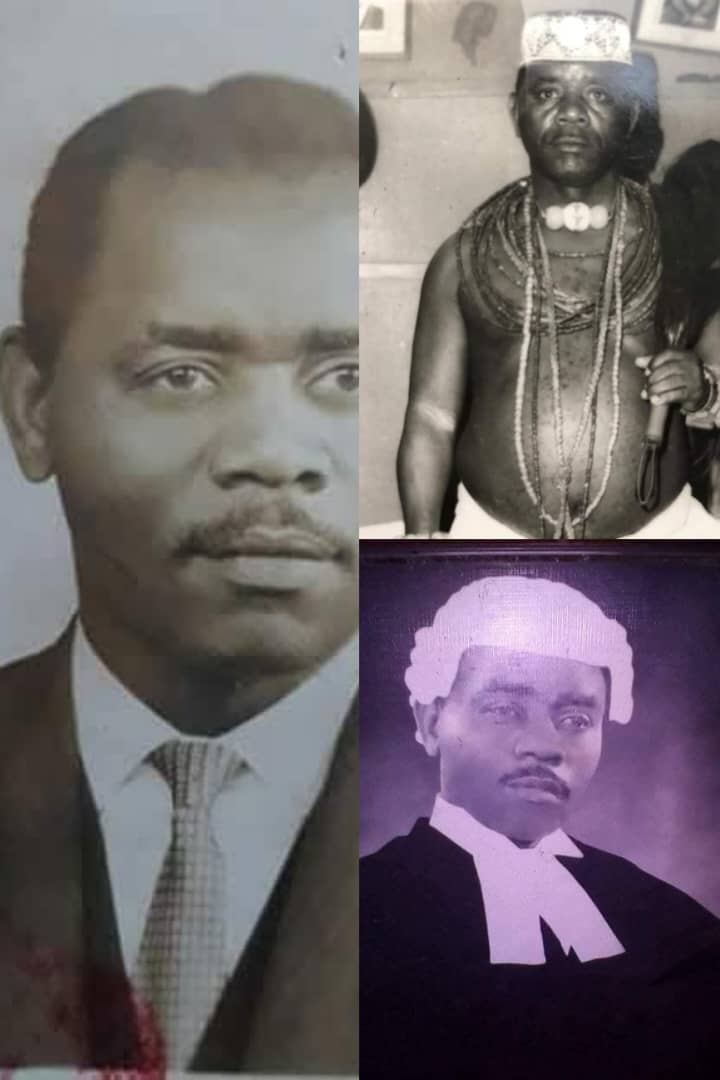
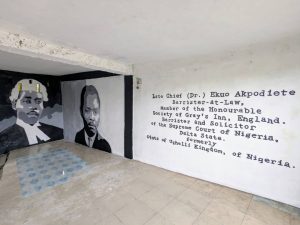
In a life of achievement, Chief Ekuogbe Akpodiete popularly called the Duke by his contemporaries in the UK was an assessment clerk, post office clerk, a court interpreter, an educationist, a business man, a political party chieftain, a Barrister and Solicitor, a Magistrate, the Otota (the Prime Minister) of Ughelli kingdom which is the highest traditional chieftaincy office that underpin the royal office of the Ovie of Ughelli Kingdom.
He was a trail blazer, a strict disciplinarian, a lover of people, and a philantropist. He saw to it that people lived in peace and happiness.
Born on the 4th of April, 1924, to parents cut from an industrious mould, Chief Ekuogbe Rowland Gregory Akpodiete took zealously to education that neither his mother Ughweriaka who was a trader, nor his father Akpodiete who was a farmer had.
He attended the Native Authority Primary School, Ughelli, and Enitona High School, Port Harcourt, for his secondary school education.
He thereafter had a brief teaching career in primary schools in Ofuoma near Ughelli, he worked as a process clerk in the then Sapele Township Department between 1950 and 1953, serving at the same time as an interpreter in the local courts.
He proceeded to the United Kingdom to seek the proverbial Golden Fleece where he worked and paid his way through, studying Law. He was admitted into the Honourable society of Gray’s Inn, England, in 1965, and shortly after, he returned home to Nigeria and attended the Nigerian Law School. He was called to the Nigerian Bar in 1966. He immediately started practice in Lagos. However, his practice in Lagos was regrettably abridged by the Nigerian Civil War, which drove him to his hometown Ughelli in 1967, where he continued to practise among his kith and kin as the first Legal Practitioner.
Chief Ekuogbe Akpodiete established himself in Ughelli. After the civil war, he served in the now defunct Mid-western State Judiciary from 1972 to 1975 as a Magistrate.
He was conferred with the chieftaincy title of Urhukperovie of Ughelli kingdom (the light of the King) by the then reigning Ovie of Ughelli, His Royal Highness Oharisi II of blessed memory in 1977.
In the quest for more knowledge, he went back to England for his Master’s degree in law (LL.M) and later a Ph.D. at the University of Warwick.
He was awarded an honourary doctorate degree (Ph.D) by Tenesse Christian University from the United States of America in 1991.
He became the Otota (the Prime Minister) of Ughelli Kingdom in 1986, an office he occupied until his demise on 9th April 1995.
Chief Ekuogbe Akpodiete was also politically involved. In the heady days of the Awolowo-led Unity Party of Nigeria, he was the party’s legal adviser in Ughelli and was on hand to assist during Chief Obafemi Awolowo’s campaign hosting in Ughelli and its environs.
In view of his love for people and entertainment, he established a popular cinema house, one of the first in Ughelli, known as REGA cinema, coined from his names, alongside an entertainment place called Unutakunu (people talk to people).
Chief Ekuogbe Akpodiete was blessed with wives and many children, grandchildren, and great grand children.
Mr. Olotu Akpodiete, PhD
Executive Director
Olotu & Ekuogbe Rowland Akpodiete foundation
-

 News13 hours ago
News13 hours agoJust in: Many Feared Killed In Abuja
-

 News16 hours ago
News16 hours agoSenator Natasha on FB listed 3 politicians that should be arrested if anything happens to her
-

 News17 hours ago
News17 hours agoEmergency Rule: We should be thankful to President Tinubu -Wike
-
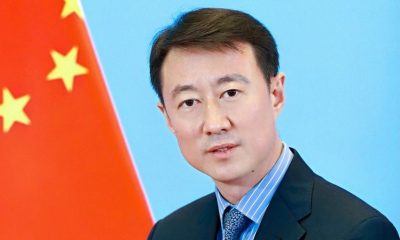
 News15 hours ago
News15 hours agoChina Reaffirms One-China Principle, Commend Support From Nigeria
-
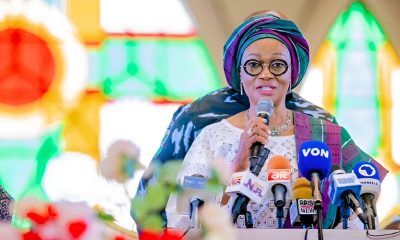
 News13 hours ago
News13 hours agoPolice clarify on report alleging First Lady’s convoy killed 7-yr-old baby
-
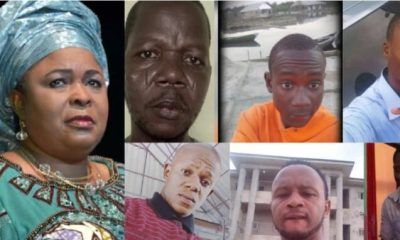
 News19 hours ago
News19 hours agoCourt Orders Fast-Tracked Trial Of 15 Workers Held In Prison For 6 Yrs Over Patience Jonathan’s Missing Jewellery
-

 News11 hours ago
News11 hours agoAbuja raid attack: Three NDLEA officers sustain gunshot injuries, hospitalized
-
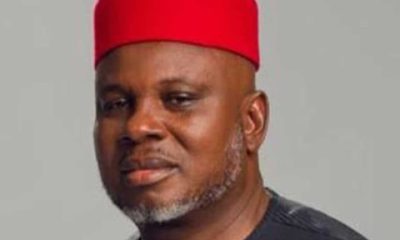
 News19 hours ago
News19 hours agoCatholic Church gives Anambra APC guber candidate rigid conditions for support


